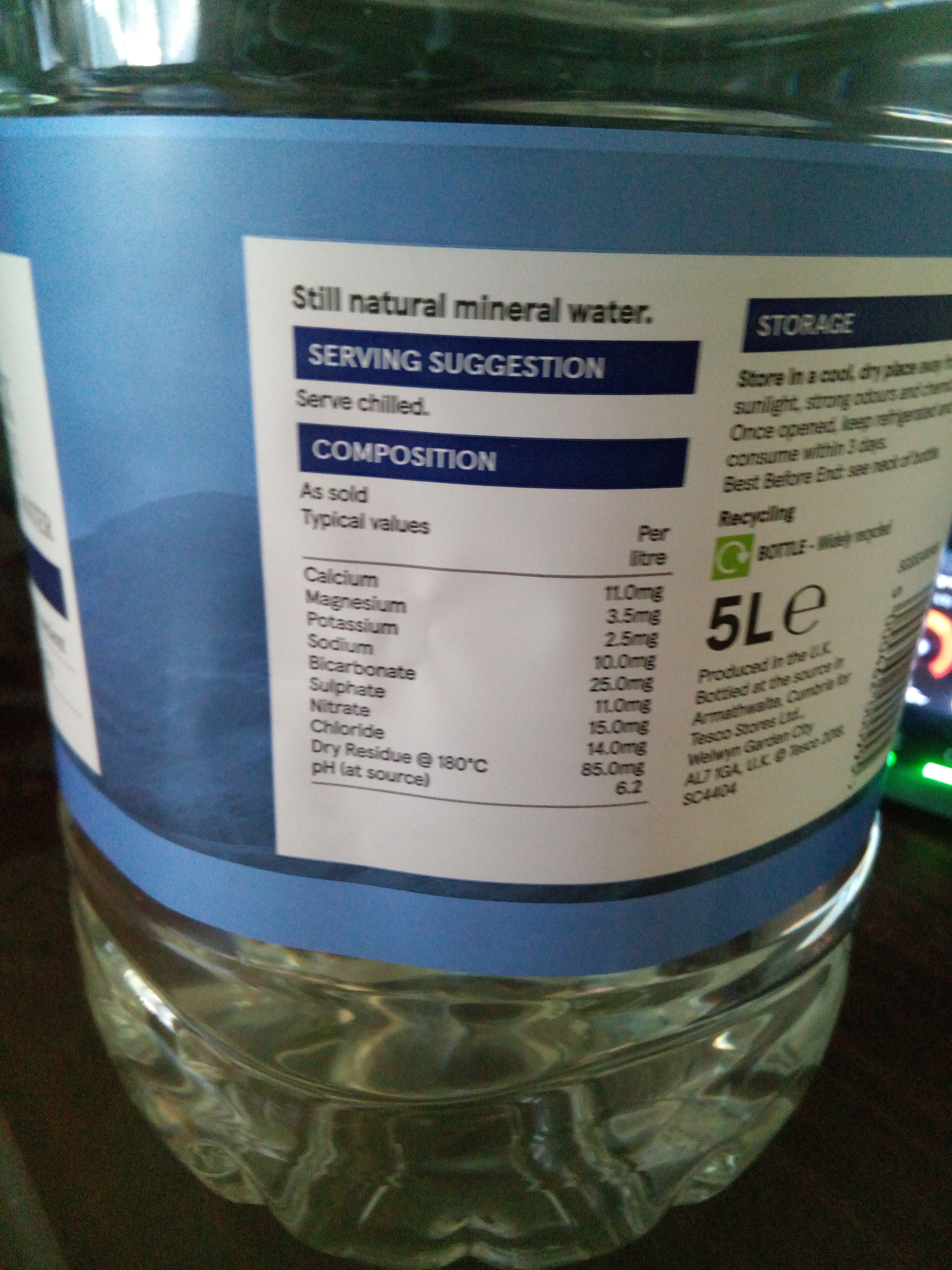Hi all,
So, I live in Kent in the UK where we have "very hard" water, my water report shows:
Ca+2: 124
Mg+2: 4.6
Na+: 33.4
Cl-: 67
SO4-2: 70
HCO3-: 397
CO3-2: 1.826
GH: 328.3
Alkalinity: 328
I have no pH meter but assume it would be fairly high.
So I've brewed several all grain and partial grain beers with this water before, usually belgian tripels and dubbels, and some darker and amber ales, they have mostly turned out really well. I've never really considered water chemistry before, but reading around IPAs, it seems that the lighter grain might struggle a bit with the high pH. I don't really want to mess around with buying RO water, salts, acids, etc. so I was wondering if an acid rest at 35-37 °C might be helpful? Looking back through my recipes, it seems like I've also had a fairly low efficiency with my mashing ~60-65% which I have put down to inexperience and technique, but is it possible that my water profile is contributing?
Does anyone with a similar water profile, or expertise in this area have experience with brewing an IPA with it?
I would definitely appreciate any feedback!
(I accept that at some point I may have to get into the nitty gritty of water chemistry, but might struggle to justify buying more equipment at the moment...)
Anyway, here's my plan:
HOME BREW RECIPE:
Brew Method: All Grain
Style Name: IPA
Boil Time: 60 min
Batch Size: 25 liters (fermentor volume)
Boil Size: 30 liters
Boil Gravity: 1.043
Efficiency: 65% (brew house)
Hop Utilization Multiplier: 1
STATS:
Original Gravity: 1.049
Final Gravity: 1.009
ABV (standard): 5.32%
IBU (tinseth): 68.01
SRM (morey): 5.1
FERMENTABLES:
6 kg - Finest Maris Otter (100%)
HOPS:
1 oz - Chinook, Type: Leaf/Whole, AA: 12.5, Use: Boil for 60 min, IBU: 34.86
0.5 oz - Olicana, Type: Leaf/Whole, AA: 7.34, Use: Boil for 30 min, IBU: 7.87
0.5 oz - Chinook, Type: Leaf/Whole, AA: 12.5, Use: Boil for 30 min, IBU: 13.4
1 oz - Olicana, Type: Leaf/Whole, AA: 7.34, Use: Boil for 15 min, IBU: 10.16
1 oz - Olicana, Type: Leaf/Whole, AA: 7.34, Use: Boil for 2 min, IBU: 1.73
1 oz - Olicana, Type: Leaf/Whole, AA: 7.3, Use: Dry Hop for 7 days
MASH GUIDELINES:
1) Strike, Temp: 37 C, Time: 30 min, Amount: 19 L
2) Increase Temperature, Temp: 66 C, Time: 60 min
3) Fly Sparge, Temp: 75 C, Amount: 12 L
Starting Mash Thickness: 3.13 L/kg
YEAST:
Lallemand - LALBREW® NOTTINGHAM HIGH PERFORMANCE ALE YEAST
Starter: No
Form: Dry
Attenuation (avg): 80%
Flocculation: High
Optimum Temp: 10 - 22.22 C
Fermentation Temp: 18 C
This recipe has been published online at:
https://www.brewersfriend.com/homebrew/recipe/view/1323864/british-ipa
Generated by Brewer's Friend - Brewer's Friend | Homebrew Beer Recipes, Calculators & Forum
Date: 2022-10-20 09:57 UTC
Recipe Last Updated: 2022-10-20 09:57 UTC
So, I live in Kent in the UK where we have "very hard" water, my water report shows:
Ca+2: 124
Mg+2: 4.6
Na+: 33.4
Cl-: 67
SO4-2: 70
HCO3-: 397
CO3-2: 1.826
GH: 328.3
Alkalinity: 328
I have no pH meter but assume it would be fairly high.
So I've brewed several all grain and partial grain beers with this water before, usually belgian tripels and dubbels, and some darker and amber ales, they have mostly turned out really well. I've never really considered water chemistry before, but reading around IPAs, it seems that the lighter grain might struggle a bit with the high pH. I don't really want to mess around with buying RO water, salts, acids, etc. so I was wondering if an acid rest at 35-37 °C might be helpful? Looking back through my recipes, it seems like I've also had a fairly low efficiency with my mashing ~60-65% which I have put down to inexperience and technique, but is it possible that my water profile is contributing?
Does anyone with a similar water profile, or expertise in this area have experience with brewing an IPA with it?
I would definitely appreciate any feedback!
(I accept that at some point I may have to get into the nitty gritty of water chemistry, but might struggle to justify buying more equipment at the moment...)
Anyway, here's my plan:
HOME BREW RECIPE:
Brew Method: All Grain
Style Name: IPA
Boil Time: 60 min
Batch Size: 25 liters (fermentor volume)
Boil Size: 30 liters
Boil Gravity: 1.043
Efficiency: 65% (brew house)
Hop Utilization Multiplier: 1
STATS:
Original Gravity: 1.049
Final Gravity: 1.009
ABV (standard): 5.32%
IBU (tinseth): 68.01
SRM (morey): 5.1
FERMENTABLES:
6 kg - Finest Maris Otter (100%)
HOPS:
1 oz - Chinook, Type: Leaf/Whole, AA: 12.5, Use: Boil for 60 min, IBU: 34.86
0.5 oz - Olicana, Type: Leaf/Whole, AA: 7.34, Use: Boil for 30 min, IBU: 7.87
0.5 oz - Chinook, Type: Leaf/Whole, AA: 12.5, Use: Boil for 30 min, IBU: 13.4
1 oz - Olicana, Type: Leaf/Whole, AA: 7.34, Use: Boil for 15 min, IBU: 10.16
1 oz - Olicana, Type: Leaf/Whole, AA: 7.34, Use: Boil for 2 min, IBU: 1.73
1 oz - Olicana, Type: Leaf/Whole, AA: 7.3, Use: Dry Hop for 7 days
MASH GUIDELINES:
1) Strike, Temp: 37 C, Time: 30 min, Amount: 19 L
2) Increase Temperature, Temp: 66 C, Time: 60 min
3) Fly Sparge, Temp: 75 C, Amount: 12 L
Starting Mash Thickness: 3.13 L/kg
YEAST:
Lallemand - LALBREW® NOTTINGHAM HIGH PERFORMANCE ALE YEAST
Starter: No
Form: Dry
Attenuation (avg): 80%
Flocculation: High
Optimum Temp: 10 - 22.22 C
Fermentation Temp: 18 C
This recipe has been published online at:
https://www.brewersfriend.com/homebrew/recipe/view/1323864/british-ipa
Generated by Brewer's Friend - Brewer's Friend | Homebrew Beer Recipes, Calculators & Forum
Date: 2022-10-20 09:57 UTC
Recipe Last Updated: 2022-10-20 09:57 UTC





























![Craft A Brew - Safale BE-256 Yeast - Fermentis - Belgian Ale Dry Yeast - For Belgian & Strong Ales - Ingredients for Home Brewing - Beer Making Supplies - [3 Pack]](https://m.media-amazon.com/images/I/51bcKEwQmWL._SL500_.jpg)









